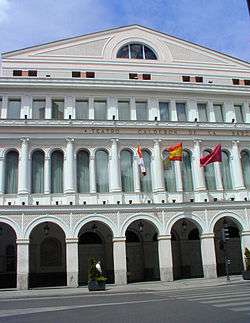Seminci
|
Giant clapperboard of the SEMINCI 2007 | |
| Location | Valladolid, Spain |
|---|---|
| Founded | 1956 |
| Website | http://www.seminci.es/ |

Valladolid International Film Festival (also known as Seminci or Semana Internacional de Cine de Valladolid) is a film festival held annually in Valladolid, Spain since 1956. Nowadays the festival is regarded as one of the most important in the specialty of independent film and auteur film.
It has introduced (to Spain) directors and cinematographers who were previously unknown there. Spanish audiences became acquainted with names such as Ingmar Bergman, Luis Buñuel, François Truffaut, Andrzej Wajda, Federico Fellini, Ermanno Olmi and Yilmaz Güney from the launch pad offered by Valladolid. The works of film-makers of the standing of Roberto Rossellini, Stanley Donen, Max Ophüls, Ken Loach, Kenji Mizoguchi, Yasujirō Ozu and Aardman Animations could be enjoyed and studied in the sections dedicated to their major works, many on view for the first time in Spain. Valladolid, through various loopholes in state censorship, was able to present films that would otherwise have been impossible to see in Spain. An award or an enthusiastic reception from the audience and the critics meant, on numerous occasions, that the official state bodies gave the go-ahead to certain films which Francisco Franco's regime considered out of line with their ideology.
Much the same occurred with distribution on the arts circuit at the end of the 1960s: a film could be placed more easily if it had previously done well at Valladolid. Even after the death of Franco in 1975, Valladolid continued to be the "testing ground" for films which had been banned. For example, the premiere in Spain of Kubrick's A Clockwork Orange at the 1975 festival is still recalled as a landmark.
As one of Europe's oldest festivals, Valladolid has always been characterised by its willingness to take risks and to innovate in its programming. It has also been keen to critically examine each new school or movement as it has arisen, whether it be German, Polish, Chinese, Canadian or otherwise. With a genuine concern for the art of cinema, for film-making and film-makers rather than the more obvious commercial or glamorous aspects of the industry, the festival has built up an identity of its own - equally attractive to enthusiasts, professionals and the media.
Between 1984 and 2004, a festival team headed by Fernando Lara contributed to the growth of the range and scope of the festival so that fiction and documentaries play alongside animations and shorts.
Between April 2005 and April 2008, Argentine film critic and writer Juan Carlos Frugone took over the reins of the festival . In June 2008, journalist Javier Angulo was appointed new director.
External links
Coordinates: 41°39′14″N 4°43′28″W / 41.65389°N 4.72444°W